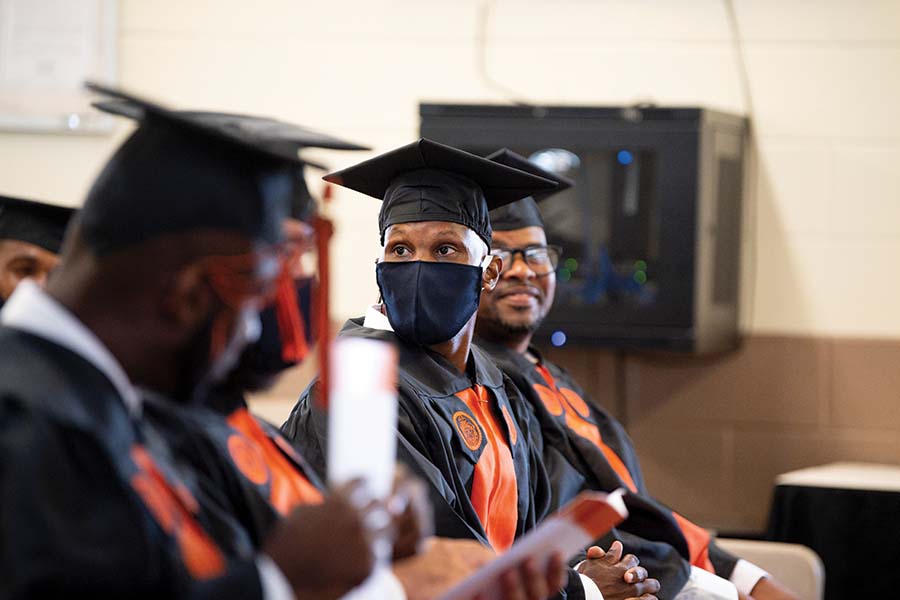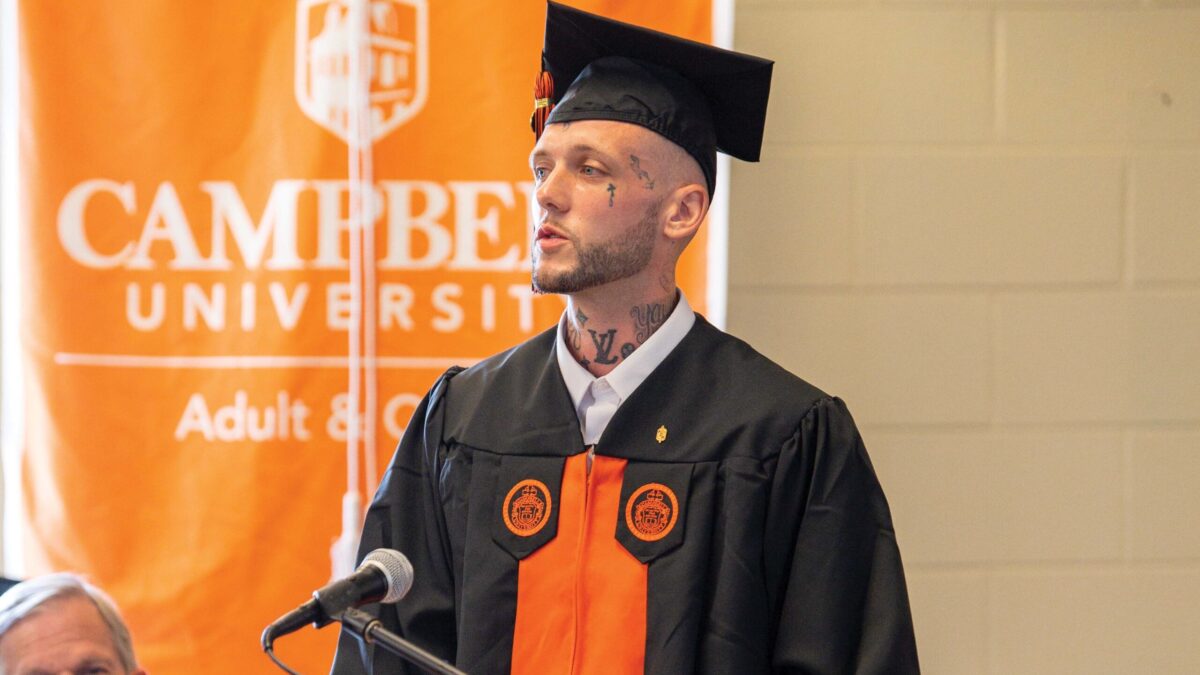Kevin Cook delivered the commencement address for the first class of associate degree graduates from Campbell’s prison teaching initiative at Sampson County Correctional Institute on Aug. 30.
“People have this perception that criminals are nothing, they’re the undesirables. I want to help them overcome that mentality and tell them, ‘Hey, I’m not bad.’ My education has transformed me.”
Wesley Lee has seen programs promising change come and go in his 10 years behind bars. Before Campbell University could count on Lee to put in the work, Campbell had to earn his trust first.
“The prison system just isn’t very consistent when it comes to things like this,” says Lee, who signed up in 2019 thinking he would be asked to take a class or two, handed a certificate (another rehabilitation “notch”) and told to move on.
This was different, Lee and his classmates learned quickly. Very different.
Campbell University’s prison teaching initiative launched as a joint effort by the University, the Bob Barker Foundation and the North Carolina Department of Public Safety in 2019. The state chose Sampson County for the two-year program — an associate degree in behavioral sciences curriculum designed to provide general education and foundational study in psychology, sociology and social work.
The courses are difficult. The professors are demanding. The students, Lee says, were hungry for this.
“When I realized this was real and that my teachers were going to hold me accountable, it was exciting. Like, it’s on me whether I pass or fail,” Lee says. “I’m from a small town, and where I grew up, you either go work on cars or go work on a farm. Before this, I never really saw myself as a college student. But now I’ve been introduced to liberal arts, and it just gives you this broader view of things. It directs you on a path to something in life you might like to do.
“More than anything, I’m learning new things about myself. About who I am and what’s best for me.”
The Campbell program is modeled after the highly ambitious, highly successful Hudson Link for Higher Education in Prison program founded in 1998 at the notorious Sing Sing Correctional Facility in Ossining, New York. Run today by a staff of formerly incarcerated men and women, Hudson Link not only provides an education to its students, but life skills and reentry support as well. The result is lowered recidivism (less than 2 percent of students in the program return to prison) and higher rates of employment, community regeneration and reciprocity.

In North Carolina, roughly 40 percent of the men and women released from prison in 2017 returned within two years, and more than half were arrested again.
As Hudson Link has shown, education is key.
“Education is effective, because it is, in one manner of speaking, tangible,” says Campbell University Executive Vice President Dr. John Roberson, an early proponent for the program at Sampson and the Christian Studies professor for the first cohort of students there. “As they prove themselves, they are earning grades, they are earning credit hours and they are earning academic honors. Ultimately, they are earning a certificate that says they have graduated — a visual representation of the internal change they have undergone.
“That’s the power of education. They can see and know — and others can see — that they were able to accomplish something meaningful.”
“I think that’s the power of it. They can see and know — and others can see — that they were able to accomplish something meaningful.”
Not every prison education program in the nation can match Hudson Link’s success rate. But overall results are still striking. A recent study by Emory University found that vocational training while behind bars lowers the recidivism rate to 30 percent. An associate degree drops the rate to nearly 14 percent. A bachelor’s degree reduces it to just under 6 percent. And for inmates who earn a master’s degree: 0 percent.
The curriculum at Sampson is also set up for the students to succeed, according to Dr. Beth Rubin, dean of Adult & Online Education and professor of psychology. The two-year associate degree emphasizes behavioral sciences, and the four-year bachelor’s degree shifts to communication studies with a focus on counseling and business skills. Those who finish the four-year plan will be equipped to succeed outside of the razor-wire fences that surround the Sampson facility.
The majority of the men now entering their third year have expressed the desire to work in the prison system or for other state and nonprofit agencies to counsel and mentor other offenders. Campbell’s program is training them to do just that, Rubin says.
“There’s a reason there is an emphasis on critical thinking,” she says. “All of this is designed to help them get employment. To give them the skills to be active, contributing members of society. To be leaders with purpose. I know it sounds hokey, but I really mean that.”
While planning the curriculum, Rubin and her staff spoke to those who lead other prison programs, and they learned that the most popular degree paths were the ones that led to careers in counseling and other service careers. The second-most popular degree was business. Campbell’s Bachelor of Arts in Public and Interpersonal Communications degree covers both of those paths — heavily loaded with psychology and counseling courses for those who choose to minor in addiction disorder, and the Bachelor of Science in Communication Studies that is more business focused.
The addiction disorder minor is only offered to students in the prison system, and it will focus on training students to become peer support specialists — a career that is in high demand nationally, Rubin says.
“We’re providing flexibility. These men will be primed with this combination of degrees to go in either direction and have the career they want when they are released,” Rubin adds. “It’s a pedagogy that focuses on giving people skills, not shoving information in their faces. It’s student-focused and learner-focused. It’s an approach that helps adults master the skills they need to succeed, whether they’re a parent going back to school, a Marine or an incarcerated individual. I don’t care how many degrees you have, if you can’t write a white paper or if you can’t write a memo to your boss, you’re not going to get a job, or you’re not going to keep a job.
“You have to be able to do it. And that’s what this education has to provide.”
Wesley Lee didn’t feel challenged by some of the vocational courses and programs that came and went early in his sentence. You show up, you do the work (or you don’t), and you get the same certificate as the man next to you, regardless of the disparity in effort put in, he says.
When he realized early on that his courses with Campbell would be time consuming and difficult, it thrilled him. Beyond the challenge of it — which Lee welcomed — the program made Lee and his classmates feel like men again. Prisons — even the most well-run facilities — can dehumanize a person, raise levels of anxiety and mollify existing problems with mental health in the incarcerated.
They are a punishment. But these are still people. And for true rehabilitation to occur, they need to feel like people.
“A lot of men here don’t know who they really are or why they do what they do,” Lee says. “But these classes have made me ask questions. Why am I in here? Why do I live the way I live? Is it because of me? Because of my family? Because of my friends? Because of this program, I’m asking these questions.
“One of the biggest things I’ve been able to take from this program is that I’ve been able to really look within myself and figure out who I am. I believe that’s important in life.”
GRATITUDE
Students in Campbell’s prison education program at Sampson County Correctional Institution penned “thank you” letters to those who have supported the program over the last two years:
For a moment, someone approached the debilitated traveler, cleaned his wounds and paid his recuperation. We saw you descend kneeled down to lift us up. Whoever you are, your words and books are rivers cleansing our minds, and your charity — our souls. We abide under your shadows instead of chasing those whom deceived us. All of you illuminate a trail of ashes to an end our plutonian trajectories cannot. An ensemble of archangels may not unshackle our hands and feet, but instead liberate our minds to persona grata. We thank you for bearing us up. For this moment, continue to be our guiding light.
-JUAN ANTONIO TELLEZ-RUIZ
I wouldn’t be in this position if it were not for you. I’ve been blessed with an opportunity that has completely changed my entire being. You’ve provided me with tools necessary in becoming a positive, productive individual in my life, my son’s life and the life of others I may encounter on my journey. I’m so blessed and privileged to be here that words aren’t able to explain my gratitude. I more than thank you for everything that’s been done for me and for allowing me to take part. I’ll forever be indebted, and I will compensate by putting my ability to use.
-KEVIN COOK

